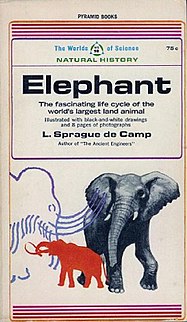
The Dragon of the Ishtar Gate is a historical novel by American writer L. Sprague de Camp, first published in hardcover by Doubleday in 1961, and in paperback by Lancer Books in 1968. The first trade paperback edition was issued by The Donning Company in 1982. The book was reissued with a new introduction by Harry Turtledove as a trade paperback and ebook by Phoenix Pick in September 2013. It is the third of de Camp's historical novels in order of writing, and earliest chronologically. It is set in 466-465 BCE, the last years of the reign of King Xerxes I of Persia.
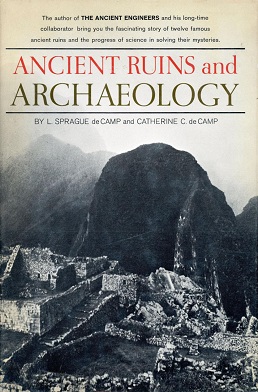
Ancient Ruins and Archaeology is a 1964 science book by L. Sprague de Camp and Catherine Crook de Camp, one of their most popular works. It was first published by Doubleday and has been reprinted numerous times by other publishers. Paperback editions since 1972 have generally reverted to the title Citadels of Mystery, which was the de Camps' original working title. Translations into French, German and Portuguese have also appeared. Portions of the work had previously appeared as articles in the magazines Astounding Science Fiction, Fate, Frontiers, Natural History Magazine, Other Worlds Science Stories, Science Fiction Quarterly, and Travel.
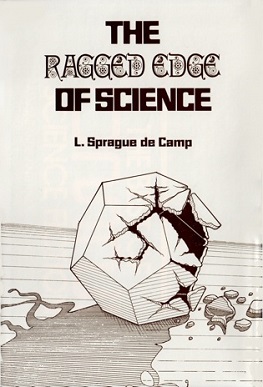
The Ragged Edge of Science is a science book by L. Sprague de Camp, illustrated by Don Simpson. It was first published by Owlswick Press in 1980.
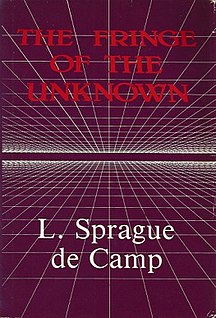
The Fringe of the Unknown is a science book by L. Sprague de Camp, first published in hardcover by Prometheus Books in 1983.

Lovecraft: A Biography is a 1975 biography of the writer H. P. Lovecraft by science-fiction writer L. Sprague de Camp, first published in hardcover by Doubleday in February 1975. A later hardcover edition was issued by Barnes & Noble in January 1996. The first paperback edition, corrected and abridged by the author, was published by Ballantine Books in August 1976. The first British edition was published by New English Library in 1976. An E-book edition of the Ballantine version of the work was published by Gollancz's SF Gateway imprint on September 29, 2011 as part of a general release of de Camp's works in electronic form. The book has also been translated into German, Russian, and several other languages.

Catherine Crook de Camp, was an American science fiction and fantasy author and editor. Most of her work was done in collaboration with her husband L. Sprague de Camp, to whom she was married for sixty years. Her solo work was largely non-fiction.
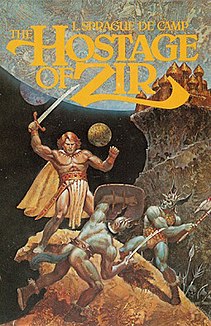
The Hostage of Zir is a science fiction novel by American writer L. Sprague de Camp, the seventh book of his Viagens Interplanetarias series and the fifth of its subseries of stories set on the fictional planet Krishna. Chronologically it is the third Krishna novel. It was first published in hardcover by Berkley/Putnam in 1977, and in paperback by Berkley Books in 1978. A new paperback edition was published by Ace Books in 1982 as part of the standard edition of the Krishna novels. An e-book edition was published by Gollancz's SF Gateway imprint on September 29, 2011 as part of a general release of de Camp's works in electronic form. The novel has also been translated into German and Czech.

The Virgin & the Wheels is a collection of two short science fiction novels by L. Sprague de Camp, published in paperback by Popular Library in 1976. An E-book edition was published by Gollancz's SF Gateway imprint on September 29, 2011 as part of a general release of de Camp's works in electronic form.
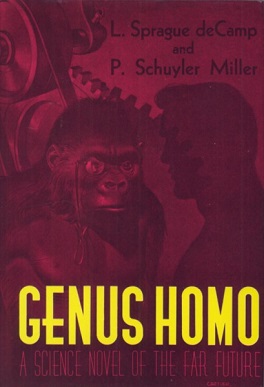
Genus Homo is a science fiction novel by American writers L. Sprague de Camp and P. Schuyler Miller. It was first published in the science fiction magazine Super Science Stories for March, 1941, and subsequently published in book form in hardcover by Fantasy Press in 1950 and in paperback by Berkley Books in 1961. An E-book edition was published by Gollancz's SF Gateway imprint on September 29, 2011 as part of a general release of de Camp's works in electronic form. It has also been translated into French, Italian and German.

The Incorporated Knight is a fix-up fantasy novel by American writers L. Sprague de Camp and Catherine Crook de Camp, the first book in their sequence of two Neo-Napolitanian novels. Chapters 1-5 first appeared as L. Sprague de Camp's short stories "Two Yards of Dragon", "The Coronet", "Spider Love" and "Eudoric's Unicorn" in Flashing Swords!, The Magazine of Fantasy and Science Fiction and The Year's Best Fantasy Stories in 1976-1977. The complete novel was first published in hardcover by Phantasia Press in August 1987, and in paperback by Baen Books in September 1988, with a trade paperback edition, also from Baen, following in 1991. An E-book edition was published by Gollancz's SF Gateway imprint on September 29, 2011 as part of a general release of de Camp's works in electronic form.

The Stones of Nomuru is a science fiction novel by American writers L. Sprague de Camp and Catherine Crook de Camp, the tenth book in the former's Viagens Interplanetarias series and the first in its subseries of stories set on the fictional planet Kukulkan. It was first published as a trade paperback by Donning/Starblaze Editions in September 1988, and as a mass market paperback by Baen Books in May 1991. An E-book edition was published by Gollancz's SF Gateway imprint on September 29, 2011 as part of a general release of de Camp's works in electronic form. It has also been translated into Italian.
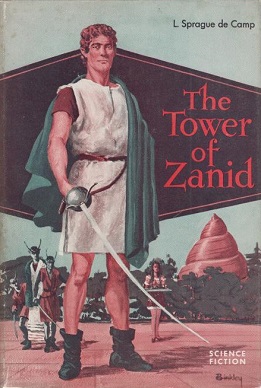
The Tower of Zanid is a science fiction novel by American writer L. Sprague de Camp, the sixth book of his Viagens Interplanetarias series and the fourth of its subseries of stories set on the fictional planet Krishna. Chronologically it is the seventh Krishna novel. It was first published in the magazine Science Fiction Stories for May 1958. It was first published in book form in hardcover by Avalon Books, also in 1958, and in paperback by Airmont Books in 1963. It has been reissued a number of times since by various publishers. For the later standard edition of Krishna novels it was published together with The Virgin of Zesh in the paperback collection The Virgin of Zesh & The Tower of Zanid by Ace Books in 1983. An E-book edition was published by Gollancz's SF Gateway imprint on September 29, 2011 as part of a general release of de Camp's works in electronic form. The novel has also been translated into Italian and German.

The Viagens Interplanetarias series is a sequence of science fiction stories by L. Sprague de Camp, begun in the late 1940s and written under the influence of contemporary space opera and sword and planet stories, particularly Edgar Rice Burroughs's Martian novels. Set in the future in the 21st and 22nd centuries, the series is named for the quasi-public Terran agency portrayed as monopolizing interstellar travel, the Brazilian-dominated Viagens Interplanetarias. It is also known as the Krishna series, as the majority of the stories belong to a sequence set on a fictional planet of that name. While de Camp started out as a science fiction writer and his early reputation was based on his short stories in the genre, the Viagens tales represent his only extended science fiction series.
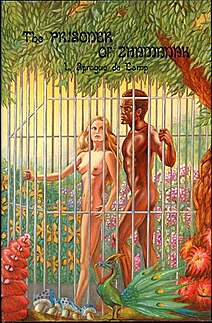
The Prisoner of Zhamanak is a science fiction novel by American writer L. Sprague de Camp, the eighth book of his Viagens Interplanetarias series and the sixth of its subseries of stories set on the fictional planet Krishna. Chronologically it is the fourth Krishna novel. It was first published in hardcover by Phantasia Press in 1982, and in paperback by Ace Books in April 1983 as part of the standard edition of the Krishna novels. An E-book edition was published by Gollancz's SF Gateway imprint on September 29, 2011 as part of a general release of de Camp's works in electronic form. The novel has also been translated into German.
Bibliography of science fiction, fantasy, historical fiction and nonfiction writer L. Sprague de Camp:
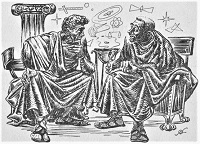
"Aristotle and the Gun" is a time travel and alternate history science fiction story by American writer L. Sprague de Camp.

"The Gnarly Man" is a science fiction story by American writer L. Sprague de Camp, about an apparently immortal Neanderthal Man surviving into the present day.

"Divide and Rule" is a science fiction novella by American writer L. Sprague de Camp. It was first published as a serial in the magazine Unknown from April to May, 1939 and first appeared in book form in de Camp's collection Divide and Rule. The story was revised for book publication. The first stand-alone book edition of the story was published as a large-print hardcover by Thorndike Press in September 2003. An E-book edition of the story was issued by Gollancz's SF Gateway imprint on September 29, 2011 as part of a general release of de Camp's works in electronic form.

